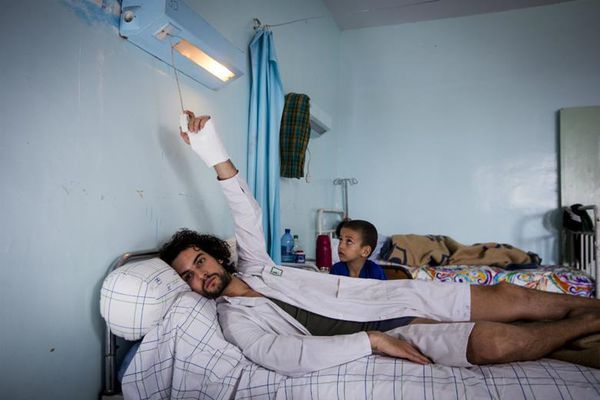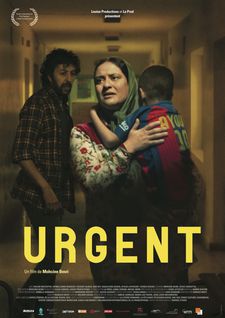 |
| Mohcine Besri: 'I'm just trying to be personal in my films to make them as universal as possible' |
Speaking to me at the 17th Marrakech Film Festival, where the film screened in competition, the 47-year-old, who now lives in Switzerland, says: Charlie Chaplin used to say: 'As long as it's personal, it's universal.' So I'm just trying to be personal in my films to make them as universal as possible."
He adds: "I quit Morocco when I was 23 years old and I live in Geneva, so you that gives me the distance from my country. I look at the healthcare and think why isn't it the same in Morocco?
"In the film, the little boy has to have a brain scan - and that's a story that happened to my mum. She was ill and it was almost too late and she couldn't get access to a scanner and she came to Switzerland. On Saturday, I took her to the Emergency Room. And they made the scan in 15 minutes and she was operated on one hour later. And when the doctor finished, he called me and he said: 'That was the last moment to do it. If we waited until tomorrow morning, she would have lost the use of half of her body.'
"I was always working on the script but, at that time, I hadn't fixed on what sort of health problem the boy would have. When I had this, I was thinking that this is something I know and I can talk about easily because I know how it is. So I tried to get it back to, what about a child? To lose the use of half of your body when you are five years old, what about if he loves football?"
The film shows how Ayoub's parents Zahra (Fatma Zahra Banacer) and Driss (Rachid Mustapha) are faced with increasingly insurmountable costs in order to get him the treatment he needs - even though universal healthcare is technically free in the country. It's a story that people from many other countries will be able to relate to. That's something Besri brought up at the production phase, when he was asked why the film - which only has two Swiss characters in minor roles - was "Swiss".
He says: "When they asked me that, I said, 'Look, this is a mum trying to save her son. I think we are not in Europe but we are still in humanity.' And they said, 'That's good.'"
The director, who wrote the script with Cécile Vargaftig and who cites his influences as including Ken Loach (I, Daniel Blake) and Nanni Moretti (We Have A Pope), says it was important for him to have some comic moments within the film.
He adds: "That was the balance, how to keep some black humour in this situation, because it's not an easy situation. I think I always need to get some humour, but still it's political humour, in my films. I think it's something very British, actually, that I love."
Besri has an unorthodox background as a filmmaker, having studied computer science before work in finance and becoming a maths teacher. Urgent is his second feature after Les Mécréants in 2011.
"I didn't study filmmaking, so I'm just trying to learn how to make films," he says. "It always starts with emotion and it's very difficult to go from emotion to words in the script and then to go to the picture and to try to get back this emotion, so I'm trying to learn how to make it."
And the film, was not without challenges, not least finding somewhere to shoot the action.
"We searched for the hospital for a year. It's hard," he says. "There was one condition that I said to my producer, 'I cannot shoot in a real place with people. I cannot say, "Silence" when people are ill.' So we were travelling the whole of Morocco and we were lucky that we found it maybe six weeks before we started shooting. It had been closed for years. That was very interesting for the set designer Armelle Demange to make it 'work' again - how to paint it and make it dirty.
"But she did a great job - we had people coming who thought that it was open again. They were hanging out, searching for doctors."
He also sings the praises of his producers.
"I was very lucky that I worked with Lamia Chraibi, my Moroccan producer, because we were talking a lot about, 'OK, this is the emotion of this scene, how am I going to make it in the picture and in the frame. I wanted to the frame to tell me a bit of the story. So that's why, each day when we finished shooting, I'd go back to the hotel and we'd spend hours talking about the scenes of the day.
"It happened once that we were talking in the morning about what we were going to shoot and I was quite sad, and she said: 'You look depressed this morning. You don't want to go to work or what?' I said: 'The scene we shot yesterday for the whole of the day, I watched them last night and it's just shit. I'm not happy at all about it. I couldn't sleep.' She told me, "You know the actor, it was his last day of shooting and he left... but have another coffee and I'll be back." She went out and called him - he was on the highway and she told him, 'OK, go off the highway and come back, we're going to shoot it again.' She came with a big smile and said, 'Think about it now, because we're going to shoot it again'.
"I had this chance with this producer - she didn't say anything about the cost of that. That's why I like to work with women as producers, because I think they're used to giving us another chance - you know, with a man, the first night is never good! So hopefully they give us another chance, and that was good."
Speaking about Youssef Alaoui, who plays Aqoub, Besri says that they auditioned around 200 boys in Casablanca and the surrounding region before expanding their search.
"Then we found this little boy from the south. When you see him in the cab in the film and he says, 'There is a train in the city' that was the first time for this kid. It was written but it was true because that was the first time he saw a tramway. His accent, for Moroccans, they feel that he comes from far away. It was very funny to have him on the set, to have this little boy coming from a small village being with the camera and stuff. All those things were like Disneyland for him.
 |
| Urgent poster |
And the film might even have a positive impact in terms of real-life healthcare in the country because of their work in the derelict hospital.
Besri says: "We were told that after we finished, because we fixed the lights and fixed the water, that maybe they will open it again. So I hope they do."
Read more reviews and features from Marrakech Film Festival.





















